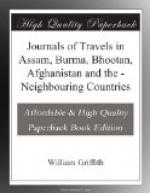Regarding the natives, I have little to say. They are a stout-built, squat, big-legged hill tribe: the women in regard to shape being exactly like their mates; and as these are decidedly ugly—somewhat tartarish-looking people, very dirty, and chew pawn to profusion—they can scarcely be said to form a worthy portion of the gentler sex. They appear to be honest; but that is a quality which, from the example of their European lords, they are said to be losing fast. They have no written character; every thing being transmitted by tradition, and performed by the interchange of tokens. They drink like fish, and manufacture a bad kind of arrack, the pernicious effects of which were experienced by the European invalids when the Sanatarium was in existence. They pay respect to their dead by the erection of a sort of kairns and large erect slabs of sandstone rounded off at the upper end: of these, I believe, they put up three or five to each friend, according to their means and, probably, rank. The Churra people cultivate nothing but a little cotton, and perhaps a species of Eleasine. They depend upon the plains for their support and supplies, and this is good management since rice at Terrya Ghat is sold at 70 or 80 seers a rupee. Their hire is, considering the cheapness of their food, very expensive; a man being rated at four annas a day, a woman at three, and a boy at two. I should add, that they have no caste.
The climate is certainly very cool and cold, the thermometer ranging from about 56 to 66 degrees in-doors at this time of the year. The rains are said to be the coldest part of the year; they are excessive, commencing in April and ceasing in October. It occasionally rains for fifteen or sixteen days in succession, and without intermission; and nine or ten inches have been known to fall in twenty-four hours. Since we have been here, inclusive of this, we have had four days of wet weather, of which three were continued rain. Both were ushered in by the sudden irruption of heavy mists from below, which soon spread over the country, obscuring every thing. These sudden irruptions occur during the partial breaking up of the rain, during which time the valleys are completely choked up with dense mists, the summits of the hills on the opposite side to that on which one stands being alone visible. After the rains were over, in the first instance, the plains, or rather the mass of haze hanging over them, presented a most curious spectacle.




